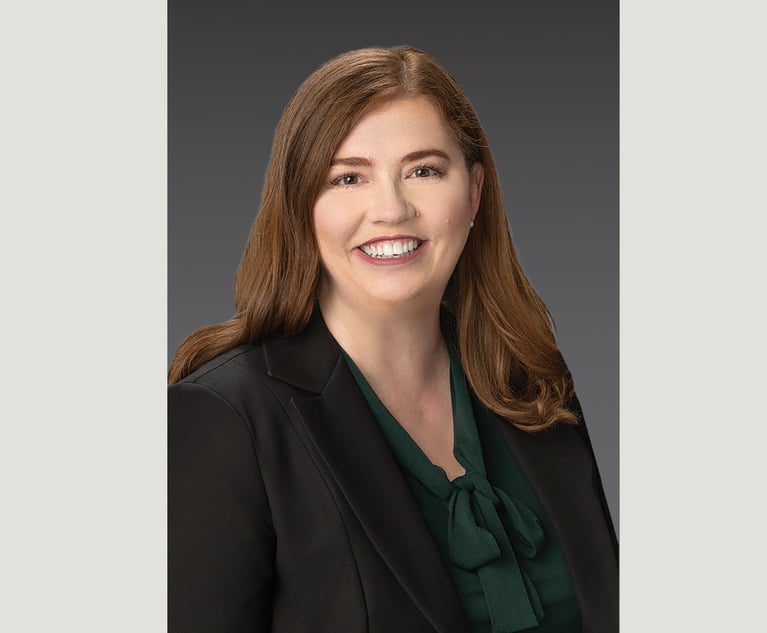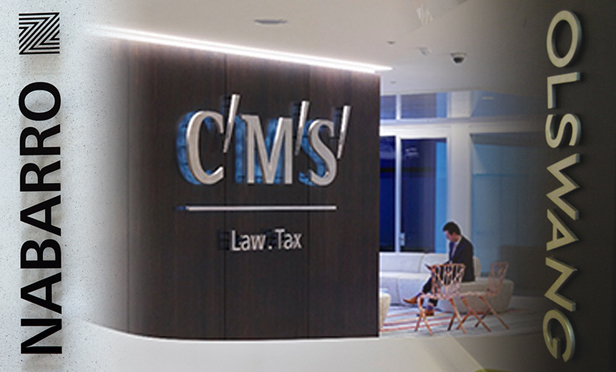'The odds are against them' – can CMS, Nabarro and Olswang pull off their daring tripartite merger?
Law firm leaders at rival firms react to confirmation of the CMS, Nabarro and Olswang merger
October 11, 2016 at 08:32 AM
6 minute read
The original version of this story was published on Law.com
"More law firm mergers have been unsuccessful than successful. On that basis, the odds are against them," says one UK top 50 senior partner of news that CMS UK, Nabarro and Olswang have agreed to merge.
Despite the impressive headline figures – £1bn-plus global revenues, around £450m in UK revenues – the sober analysis is typical of much of the market response to yesterday's confirmation of the three-way merger.
However, despite the undeniable challenges, there is optimism among some senior figures in the market.
Macfarlanes senior partner Charles Martin comments: "It is not uncommon to look at mergers and think: 'will 2+2=4, never mind 5?' This one should be good for all three firms and their clients. Nabarro has renowned real estate capability, Olswang has leading technology credentials, and injecting those into CMS's well-run platform should work all round. So, 3+3=7, possibly."
Gowling WLG's head of international projects, Quentin Poole, agrees, saying: "I entirely see why Nabarro and Olswang want to do this. Arguably, both firms needed to do something to gain market share, so you can see that merging with a much larger firm is a good plan."
Motivations to merge
For Olswang, the merger has been a long time coming. Former CEO David Stewart first approached CMS Cameron McKenna about a possible tie-up in 2014 and the firm has since been linked to a string of UK firms, including Bird & Bird, Simmons & Simmons and Osborne Clarke.
The current management team will be hoping that the merger will bring to an end a period of severe instability that has included the loss of a 50-lawyer team in Berlin to Greenberg Traurig last summer, a steady trickle of partner exits and an 11% contraction in revenue during the 2015-16 financial year.
Current and former partners welcome the deal, with one Olswang partner saying the merger will provide a "great new platform" that will provide the "ability to do bigger transactions" and open the door to more bank panels.
An ex-partner adds: "It's good for Olswang – they needed to do a merger. They were losing partners left, right and centre and it is something they have been trying to do for a while."
For Nabarro, the merger offers an opportunity to diversify its business, which has long been viewed as overly reliant on real estate – a market that, post-Brexit, looks challenging.
And for CMS UK, which has made it clear that the US is a priority for the firm, the tie-up adds scale within the wider CMS network and may make the firm a more appealing prospect for any potential Stateside suitors. As Fieldfisher managing partner Michael Chissick says: "It may make them more attractive to a US merger – there certainly will be no shortage of American firms interested in a firm with £1bn in revenues."
Sectors, synergies and scale
The leaders of the three firms say the new entity will have a focus on six sectors: energy; financial services; infrastructure and projects; life sciences and healthcare; real estate; and technology, media and telecoms (TMT).
Watson Farley & Williams co-managing partner Chris Lowe says the merger is "a good opportunity for each firm" and adds: "I can see the synergies, so it makes sense to me."
One CMS partner comments: "The combination of the TMT and fintech expertise here and at Olswang is interesting and very beneficial, as we didn't have the bench strength in that area. Nabarro's real estate finance expertise, debt funds practice and enhanced corporate client base will be extremely helpful for us."
Others though are more sceptical about the degree to which the three firms are compatible and argue that the tie-up is more about bulking up than anything else.
One UK law firm leader says: "It's about scale, not synergy. If it's about adding strength and depth in certain key areas or strategy alignment, then I am not sure what hangs it together."
Others see it as a move to boost the balance of power between CMS UK's partnership and the network's other European arms, including CMS Bureau Francis Lefebvre in France and CMS Hasche Sigle in Germany, with one senior law firm leader saying there is a "fair degree of tension between CMS UK and Germany".
Winners and losers
As is often the case with major mergers, there is likely to be some fallout, especially given the amount of office duplication across the three firms. Partners in Olswang's continental offices look particularly exposed, with partners in its Paris and Munich offices understood to be examining alternative options to joining the merged firm.
One leader at a rival law firm says: "I am sure there will be casualties. When the headcount is looked at there will be people leaving – lawyers as well as business services staff."
Another adds: "There is clearly a lot of duplication, most obviously in back office but also with practice heads. Inevitably there will be disaffected people, some of whom will move on."
Both Olswang and Nabarro partners have agreed to a lock-in as part of the merger deal, but there are likely to be exits before the merger goes live next May.
"Various bits of Olswang may decide to go their own way… I suspect we might see more of that kind of thing," one ex-partner says.
The challenges of making a success of such an ambitious merger are clear, with partners citing key difficulties including the integration of cultures, systems and offices.
Chissick says: "It is going to be difficult – they are three mid-tier firms with three cultures, three brands, three methods of remuneration and three IT systems. Culture can be the making or breaking of a merger – and how do you create a culture for that size of firm?"
Macfarlanes' Martin adds: "I am sure there will be challenges in executing it – sorting out systems, sorting out real estate, sorting out people and clients will be tricky and time-consuming. Doing two at one time is tough – doing three will be quite an organisational feat."
NOT FOR REPRINT
© 2025 ALM Global, LLC, All Rights Reserved. Request academic re-use from www.copyright.com. All other uses, submit a request to [email protected]. For more information visit Asset & Logo Licensing.
You Might Like
View All
Shareholder Democracy? The Chatter Elon Musk’s Tesla Pay Case Is Spurring Between Lawyers and Clients
6 minute read
Are Counsel Ranks Getting 'Squeezed' as Nonequity and Associate Pay Grows?
5 minute read
AI's Place in Big Law Broadens, As Firms Embrace Fresh Uses of the Technology

'Be Prepared and Practice': Paul Hastings' Michelle Reed Breaks Down Firm's First SEC Cybersecurity Incident Disclosure Report
Trending Stories
- 1The Legal Status of Presidential Diaries Must Be Clarified
- 2Litigators of the Week: Shortly After Name Partner Kathleen Sullivan’s Retirement, Quinn Emanuel Scores Appellate Win for Vimeo
- 3Litigator of the Week Runners-Up and Shout-Outs
- 4Weil Hires White & Case Partner in Rebuild of London Finance Ranks
- 5Morgan Lewis Closes Shenzhen Office After Less Than Two Years
Who Got The Work
J. Brugh Lower of Gibbons has entered an appearance for industrial equipment supplier Devco Corporation in a pending trademark infringement lawsuit. The suit, accusing the defendant of selling knock-off Graco products, was filed Dec. 18 in New Jersey District Court by Rivkin Radler on behalf of Graco Inc. and Graco Minnesota. The case, assigned to U.S. District Judge Zahid N. Quraishi, is 3:24-cv-11294, Graco Inc. et al v. Devco Corporation.
Who Got The Work
Rebecca Maller-Stein and Kent A. Yalowitz of Arnold & Porter Kaye Scholer have entered their appearances for Hanaco Venture Capital and its executives, Lior Prosor and David Frankel, in a pending securities lawsuit. The action, filed on Dec. 24 in New York Southern District Court by Zell, Aron & Co. on behalf of Goldeneye Advisors, accuses the defendants of negligently and fraudulently managing the plaintiff's $1 million investment. The case, assigned to U.S. District Judge Vernon S. Broderick, is 1:24-cv-09918, Goldeneye Advisors, LLC v. Hanaco Venture Capital, Ltd. et al.
Who Got The Work
Attorneys from A&O Shearman has stepped in as defense counsel for Toronto-Dominion Bank and other defendants in a pending securities class action. The suit, filed Dec. 11 in New York Southern District Court by Bleichmar Fonti & Auld, accuses the defendants of concealing the bank's 'pervasive' deficiencies in regards to its compliance with the Bank Secrecy Act and the quality of its anti-money laundering controls. The case, assigned to U.S. District Judge Arun Subramanian, is 1:24-cv-09445, Gonzalez v. The Toronto-Dominion Bank et al.
Who Got The Work
Crown Castle International, a Pennsylvania company providing shared communications infrastructure, has turned to Luke D. Wolf of Gordon Rees Scully Mansukhani to fend off a pending breach-of-contract lawsuit. The court action, filed Nov. 25 in Michigan Eastern District Court by Hooper Hathaway PC on behalf of The Town Residences LLC, accuses Crown Castle of failing to transfer approximately $30,000 in utility payments from T-Mobile in breach of a roof-top lease and assignment agreement. The case, assigned to U.S. District Judge Susan K. Declercq, is 2:24-cv-13131, The Town Residences LLC v. T-Mobile US, Inc. et al.
Who Got The Work
Wilfred P. Coronato and Daniel M. Schwartz of McCarter & English have stepped in as defense counsel to Electrolux Home Products Inc. in a pending product liability lawsuit. The court action, filed Nov. 26 in New York Eastern District Court by Poulos Lopiccolo PC and Nagel Rice LLP on behalf of David Stern, alleges that the defendant's refrigerators’ drawers and shelving repeatedly break and fall apart within months after purchase. The case, assigned to U.S. District Judge Joan M. Azrack, is 2:24-cv-08204, Stern v. Electrolux Home Products, Inc.
Featured Firms
Law Offices of Gary Martin Hays & Associates, P.C.
(470) 294-1674
Law Offices of Mark E. Salomone
(857) 444-6468
Smith & Hassler
(713) 739-1250









